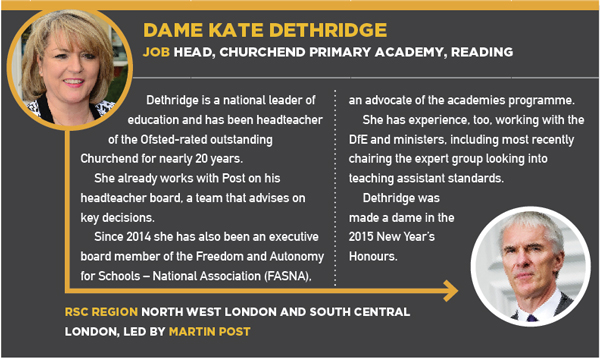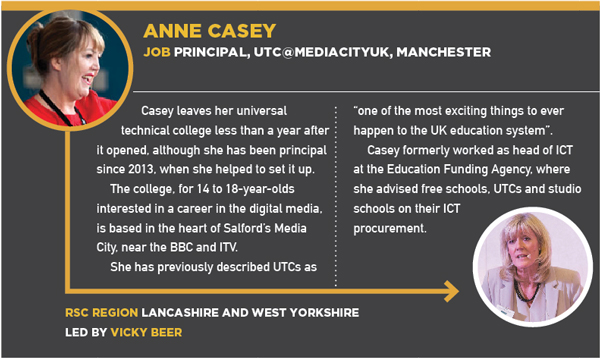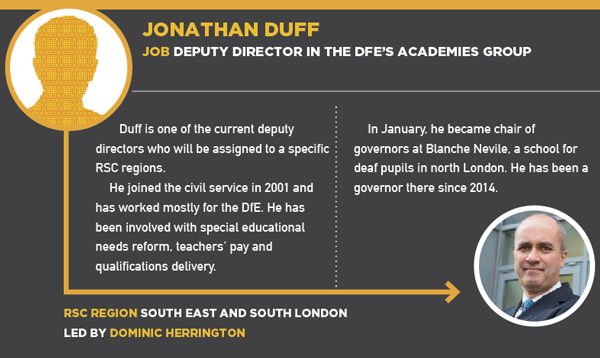Each regional schools commissioner (RSC) will now have two deputy directors – paid up to £95,000 each – to help with increased workload as the government gears up for mass academisation.
The Department for Education (DfE) has created 19 new senior leadership roles to support RSC offices. Eight senior leaders will be recruited from education and 11 from current Whitehall posts.
The eight education leaders are believed to have already been recruited; however, the names of only four have emerged (see below).
They include two headteachers, an education consultancy chief and a council education assistant director.
Six of the new civil servant deputy directors will be reshuffled from elsewhere in Whitehall.
The remaining five will be deputy directors already working in the government’s academies group, who will be assigned to specific RSC offices.
Schools Week has been told that each RSC will get two deputy directors – leaving the remaining staff potentially to support Sir David Carter (pictured above), the national schools commissioner.
Are the RSC deputies ‘another layer of bureaucracy’?
The government is preparing for an increase in the number of schools converting into academies. New powers will force them to switch if they are classed as coasting, or if they are in council areas deemed underperforming or unviable.
But the posts had advertised salaries of £95,000, which leaves the department facing an extra £1.8 million on its salaries bill.
The DfE said it was important RCSs had the right resources to build capacity in the system and to hold schools to account for their performance.
However, the appointments have been criticised as another layer of bureaucracy.
Russell Hobby, general secretary of the National Association of Head Teachers, had called for more RSCs to work within smaller and “more manageable” regions.
“Instead, we have the creation of deputy RSCs, which, rather than help to connect RSCs more closely with the areas they serve, potentially add in another layer of bureaucracy.”
However, in a monthly newsletter sent to academies last month, Dominic Herrington, RSC for the South East and South London, played down fears of bureaucracy.
He wrote: “I am very determined we will never be any kind of distant bureaucracy, but we do need extra resource to be able to carry out our duties and help with multi-academy trust development.”
Who will take the role?
In the same letter Herington announced his two new deputies start this month. They are Maria Dawes, head of school effectiveness at education school improvement consultancy Babcock, and Jonathan Duff, currently a deputy director in the DfE academies group.
The other known deputies are; Anne Casey, principal at UTC@MediaCityUK; Dame Kate Dethridge, headteacher at Churchend primary academy in Reading; and Jonathan Lewis, assistant director of learning, skills and education at Northamptonshire county council.
An applicant pack for the roles said they were for three-year contracts, with a possible extension of up to a year or a secondment.
Schools Week approached each of the new appointments via their current employers for comment, but none responded.
A DfE spokesperson said: “Deputy directors will complement the senior leadership teams in each RSC’s office, helping to deliver the expansion of the academies programme and recruit strong sponsors.”





Save







The article states that a DfE spokesperson said: “Deputy directors will complement the senior leadership teams in each RSC’s office.”
Complement!!
So as well as the RSC and 2 deputies, who else is in each Senior Leadership Team of each RSC? Can Schools Week shed some light on this?
Is this just the DfE recreating Local Authorities’ resource in their own image?